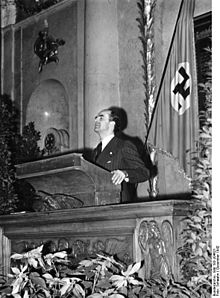Ernesto Grassi
Ernesto Grassi | |
|---|---|
 Prof. Grassi at the lectern in Berlin | |
| Born | May 2, 1902 |
| Died | December 22, 1991 (aged 89) |
| Nationality | Italian |
| Occupation | Philosopher |
Ernesto Grassi (May 2, 1902 – December 22, 1991) was an Italian philosopher.
Life
He maintained an "intimate friendship" with Donald Phillip Verene [1].
Thought
Grassi sought to take up the Heideggerean destruktion of metaphysics and seeking instead to ground philosophy in the tradition of rhetoric. [2] He identified the Italian humanist tradition as a potential site to begin a new type of philosophy, one grounded in rhetoric. In this tradition, "work and metaphor are the source of human history and society" an approach to thought which must reject the rational, proceeding as it does from "general and necessary premises." [3]
His work Rhetoric as Philosophy was "the first protracted attempt to synthesize Italian Humanism with rhetoric, as a source of philosophical invention." [4]
References
- ^ Crusius, Timothy. "New Preface" in Rhetoric as Philosophy: The Humanist Tradition. Trans. John Michael Krois and Azizeh Azodi. Carbondale: Southern Illinois University Press, 2001.
- ^ Ernesto Grassi and John Michael Krois. "Italian Humanism and Heidegger's Thesis of the End of Philosophy." Philosophy & Rhetoric, Vol. 13, No. 2 (Spring, 1980), pp. 79-98.
- ^ Grassi, Ernesto and Krois, John Michael. "Can Rhetoric Provide a New Basis for Philosophizing? The Humanist Tradition." Philosophy & Rhetoric Vol. 11, No. 2, Spring 1978.
- ^ Farell, Thomas B. Rhetoric Review, Vol. 21, No. 1, (2002), p. 101.
